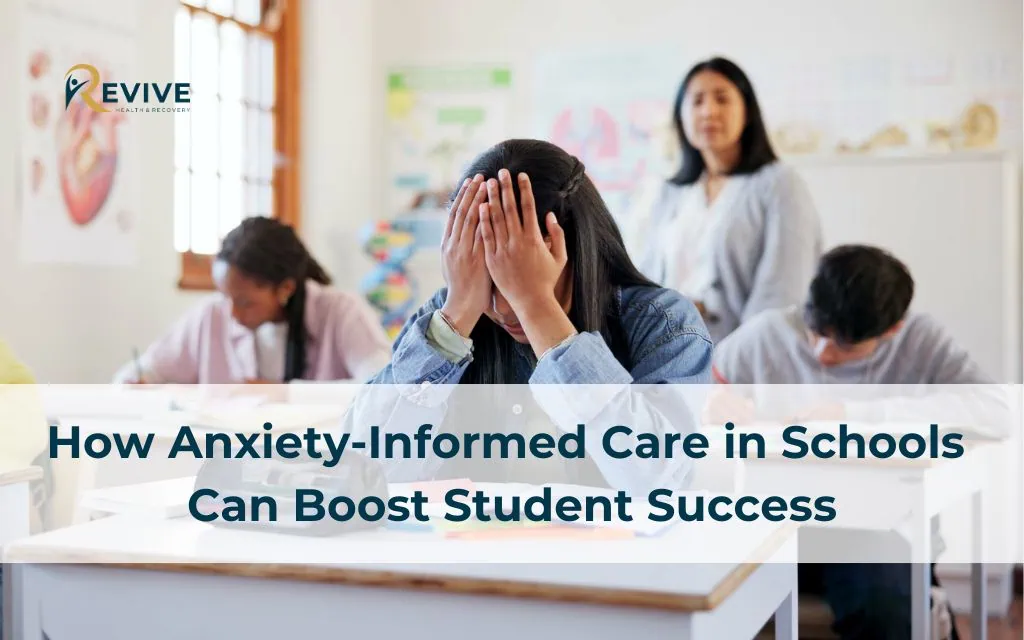In today’s fast-paced educational environment, students face unprecedented pressures that can trigger anxiety and impact their ability to learn effectively. As mental health challenges continue to rise among school-aged children, implementing anxiety-informed care in schools has become essential for creating supportive learning environments where all students can thrive.
Are you concerned about how anxiety is affecting students in your school? Understanding the fundamentals of anxiety-informed approaches can transform your educational setting and improve outcomes for struggling students. At Revive Health Recovery, we believe that proper mental health support in educational settings is crucial for student success. Have questions about implementing these strategies? Our specialists are available 24/7 at (303) 268-4655.
Understanding Anxiety-Informed Care in Educational Settings
What Is Anxiety-Informed Care in Schools?
Anxiety-informed care in schools represents a comprehensive approach that recognizes and addresses the impact of anxiety on student learning and wellbeing. Unlike traditional mental health interventions that focus primarily on individual treatment, anxiety-informed care creates systemic changes throughout the educational environment to support all students, whether they have diagnosed anxiety disorders or simply experience situational stress.
This approach shares similarities with trauma-informed care, which many educators may already be familiar with. However, anxiety-informed care specifically focuses on recognizing and responding to anxiety symptoms and triggers that might otherwise go unnoticed in busy classroom settings. By integrating mental health awareness directly into educational practices, schools can create environments where students feel safe, supported, and ready to learn.
Why do Colorado schools particularly need specialized anxiety support? The unique challenges facing our state’s youth require tailored approaches. Colorado ranks 16th in child well-being nationally, but faces specific challenges with youth mental health that demand attention. In fact, over 109,000 Colorado children (approximately 10% of those aged 3-17) have reported experiencing anxiety or depression, highlighting the urgent need for anxiety-informed educational practices.
The State of Student Anxiety in Colorado: Key Statistics
Understanding the scope of anxiety among students provides essential context for implementing effective interventions. Recent data reveals both challenges and promising trends in youth anxiety across Denver and Colorado.
The pandemic significantly impacted anxiety levels in Colorado students, with many experiencing heightened symptoms during extended periods of isolation and uncertainty. However, recent surveys show encouraging improvements. While approximately 40% of Colorado youth reported experiencing depression symptoms in 2021, that number decreased to 26% in 2023, suggesting that targeted mental health initiatives are making a difference.
Despite these improvements, significant disparities in mental health resources persist across Denver schools. Some areas benefit from robust mental health professional staffing, while others struggle with limited access to qualified counselors, psychologists, and social workers. This uneven distribution of resources creates inequities in student support that anxiety-informed approaches can help address by equipping all school staff with fundamental skills for supporting anxious students.
Colorado has implemented several innovative programs to address these challenges, including the 6th-12th Grade Mental Health Screening Program and Project AWARE, which builds integrated school-based mental health services. These initiatives demonstrate Colorado’s commitment to improving student mental health outcomes.
Wondering how your school compares to others in mental health support? Our specialists at Revive Health Recovery can provide insights and recommendations tailored to your specific situation. Reach out to us at contact@revivehealthrecovery.com to learn more.
Building Anxiety-Informed School Environments in Colorado
Creating educational settings that truly support students with anxiety requires thoughtful planning and implementation at multiple levels. From classroom design to school-wide policies, every aspect of the school environment can either exacerbate or alleviate student anxiety.
Creating Supportive School Cultures that Reduce Anxiety
The physical environment of Denver schools can significantly impact student anxiety levels. Consider how classroom layouts, lighting, noise levels, and other sensory elements might trigger anxiety symptoms in sensitive students. Simple modifications like creating quiet corners, using natural lighting when possible, and reducing visual clutter can make a substantial difference for anxious students.
Policies and procedures can either minimize or exacerbate anxiety triggers. Schools implementing anxiety-informed care in Colorado review their approaches to discipline, testing, and other potentially stressful situations to ensure they don’t unnecessarily increase student distress. For example, providing flexible testing accommodations or implementing restorative practices instead of punitive discipline can create a more supportive atmosphere for all students.

Building safe, predictable routines offers anxious Colorado students the security they need to engage fully in learning. When students know what to expect throughout their school day, they can focus more effectively on academic content rather than managing uncertainty-related anxiety. Visual schedules, consistent transitions, and clear expectations help create the predictability that anxious students crave.
Training Colorado Educators in Anxiety-Informed Practices
Professional development opportunities in the Denver area have expanded to meet the growing need for anxiety-informed training. Workshops focusing on recognizing anxiety symptoms, implementing supportive classroom strategies, and responding effectively to anxiety-related behaviors provide educators with essential tools for supporting their students.
Recognizing anxiety symptoms across diverse student populations requires cultural competence and awareness of how anxiety may manifest differently based on cultural background, age, and individual characteristics. Some students might display classic symptoms like avoidance or perfectionism, while others might express anxiety through irritability, defiance, or physical complaints. Comprehensive training helps educators identify anxiety in all its forms.
Developing essential skills for de-escalating anxiety in classroom settings empowers teachers to intervene effectively when students become overwhelmed. Strategies like guided breathing, grounding techniques, and cognitive reframing can be implemented discreetly within regular classroom activities, providing immediate support without drawing unwanted attention to struggling students.
Need specialized training for your school staff? Revive Health Recovery offers customized workshops on anxiety-informed practices tailored to your school’s specific needs. Call us at (303) 268-4655 to discuss training options.
Evidence-Based Anxiety Interventions for Colorado Schools
Implementing anxiety-informed care requires more than good intentions—it demands evidence-based approaches proven to make a difference for anxious students. By incorporating research-backed strategies, Colorado schools can maximize their impact while efficiently utilizing limited resources.
Classroom Strategies for Managing Student Anxiety
Proven accommodations for anxious students can be implemented by any teacher, regardless of specialized training. These might include:
- Providing advance notice of changes in routine
- Offering alternative ways to demonstrate knowledge besides public speaking
- Creating safe ways for anxious students to ask for help
- Allowing movement breaks or fidget tools to manage physical symptoms
- Implementing flexible deadlines when possible
Cognitive-behavioral techniques adapted for educational settings offer powerful tools for addressing anxiety directly in the classroom. Teachers can incorporate thought-challenging activities, help students identify and label emotions, and teach practical problem-solving approaches that counteract anxiety-driven thinking patterns.
Mindfulness and relaxation practices have gained traction in Colorado classrooms as effective approaches for managing anxiety. Simple breathing exercises, brief guided meditations, or body awareness activities can be integrated into daily routines, helping students develop self-regulation skills that serve them well beyond the classroom walls.
School-Wide Anxiety Prevention and Intervention Programs

Screening protocols used in Colorado schools help identify students who may need additional support. Colorado’s innovative 6th-12th Grade Mental Health Screening Program represents a systematic approach to early identification, allowing schools to connect students with appropriate resources before anxiety significantly impacts their educational experience.
Tiered support systems provide varying levels of intervention based on student needs. Universal strategies benefit all students, while targeted approaches address those with elevated risk factors, and intensive interventions support students with diagnosed anxiety disorders. This multi-level approach ensures efficient use of resources while meeting diverse student needs.
Success stories from Denver area schools demonstrate the profound impact of well-implemented anxiety-informed approaches. For example, several Denver Public Schools have reported improvements in attendance, academic performance, and overall school climate after implementing comprehensive anxiety support programs. These success stories provide valuable blueprints for other schools looking to enhance their mental health support systems.
Are you seeing signs of anxiety in your students? Early intervention is key. Contact our specialists at Revive Health Recovery to learn how we can support your school’s mental health initiatives. Email us at contact@revivehealthrecovery.com for a personalized consultation.
Colorado Resources for Implementing Anxiety-Informed Care
Colorado schools benefit from a wealth of resources specifically designed to support mental health initiatives. Understanding and accessing these resources can significantly enhance a school’s ability to implement effective anxiety-informed care.
State and Local Support for School Mental Health Initiatives
The Colorado Department of Education offers numerous resources for schools implementing anxiety-informed approaches, including the comprehensive School Mental Health Toolkit. This practical guide provides step-by-step implementation strategies, assessment tools, and best practice recommendations tailored to Colorado’s unique educational landscape.
Denver Public Schools has developed several mental health initiatives that can serve as models for other districts. These include embedded mental health professionals, teacher training programs, and family education resources that collectively create robust support systems for anxious students.
Grant opportunities and funding sources exist specifically for Colorado schools looking to enhance their mental health services. Federal programs like Project AWARE complement state-level initiatives, providing crucial financial support for schools committed to improving student mental health outcomes. Navigating these funding opportunities requires strategic planning and often benefits from partnerships with experienced mental health organizations.
Partnerships with Mental Health Providers in Colorado
Collaboration models with community agencies offer schools expanded capacity for supporting student mental health. By partnering with local mental health centers, private practices, or nonprofit organizations, schools can provide more comprehensive services than would be possible using only internal resources.
Telehealth options have become increasingly important for Denver area schools, particularly those in underserved communities with limited access to mental health professionals. Virtual therapy sessions, consultation services, and crisis response can bridge geographical gaps and ensure all students receive timely support regardless of their school’s location.
University partnerships for research and support create mutually beneficial relationships between Colorado schools and higher education institutions. These partnerships often provide schools with access to cutting-edge interventions while offering universities valuable research opportunities and training sites for graduate students in mental health fields.
Not sure which resources best fit your school’s needs? Let our experienced team at Revive Health Recovery guide you through the options. Call us at (303) 268-4655 for personalized recommendations.
Involving Families in Anxiety-Informed Care
Effective anxiety-informed care extends beyond school walls to include families as essential partners in supporting student wellbeing. By engaging parents and caregivers meaningfully, schools can create consistent support systems that reinforce anxiety management skills across settings.

Parent Education and Engagement Strategies
Resources for Colorado families of anxious students have expanded significantly in recent years. Parent workshops, informational materials, and support groups provide caregivers with essential knowledge about anxiety and practical strategies for supporting their children at home. The Colorado School Mental Health Toolkit includes specific sections for family engagement that schools can adapt to their communities’ needs.
Communication protocols between schools and families ensure consistent support for anxious students. Regular updates, collaborative problem-solving meetings, and shared decision-making create strong partnerships that benefit struggling students. Digital platforms, translation services, and flexible meeting times can overcome common barriers to family engagement.
Supporting anxiety management at home and school requires coordination and consistency. When parents and educators use similar language, strategies, and approaches for addressing anxiety, students receive clear messages about effective coping. Simple tools like shared vocabulary for emotions, consistent relaxation techniques, and regular check-ins help create seamless support across environments.
Cultural Considerations for Denver’s Diverse Communities
Culturally responsive anxiety support recognizes that different communities may conceptualize, express, and address mental health concerns in unique ways. Denver’s diverse population requires approaches that honor various cultural perspectives while providing effective support for all students experiencing anxiety.
Multilingual resources for Denver families ensure that language differences don’t create barriers to understanding and implementing anxiety-informed strategies. Translated materials, interpreter services, and bilingual staff members help schools connect meaningfully with all families in their community.
Addressing stigma around mental health requires sensitivity and persistence, particularly in communities where mental health concerns have traditionally been viewed negatively or kept private. By framing anxiety support as part of comprehensive educational services rather than labeling or pathologizing students, schools can build trust with families from all cultural backgrounds.
Is your family struggling with a student’s anxiety? Our compassionate team at Revive Health Recovery understands the challenges you’re facing. Contact us at contact@revivehealthrecovery.com to discuss how we can support your family’s journey.
Measuring Success of Anxiety-Informed Approaches
Implementing anxiety-informed care represents a significant investment of time, resources, and energy. Measuring outcomes helps schools demonstrate impact, refine approaches, and make data-informed decisions about future mental health initiatives.
Evaluation Metrics for Colorado Schools
Indicators of effective anxiety-informed environments include both quantitative and qualitative measures. Schools might track attendance patterns, disciplinary referrals, nurse visits for somatic complaints, or counseling service utilization to identify trends related to anxiety levels. Additionally, climate surveys, focus groups, and stakeholder feedback provide valuable insights into perceived safety, support, and stress levels within the school community.
Data collection methods and tools used in Colorado schools range from standardized assessments to customized tracking systems. The Colorado Department of Education offers several recommended measurement instruments specifically designed for school mental health initiatives. These tools provide consistent metrics that allow for comparison across schools and over time.
Using results to refine approaches ensures that anxiety-informed care continues to evolve and improve. Rather than viewing evaluation as simply a compliance requirement, effective schools create feedback loops where assessment data directly informs program adjustments. This continuous improvement model maximizes impact while efficiently utilizing limited resources.
Long-Term Benefits for Colorado Students and Schools
Academic performance improvements often follow successful implementation of anxiety-informed care. When students spend less mental energy managing anxiety symptoms, they can focus more effectively on learning, problem-solving, and creative thinking. Several Colorado schools have documented significant gains in test scores, course completion, and graduation rates after implementing comprehensive anxiety support programs.
School climate and culture enhancements represent another significant benefit of anxiety-informed approaches. When all community members understand anxiety and respond supportively, the entire school atmosphere becomes more inclusive, empathetic, and positive. These cultural shifts benefit not only anxious students but all members of the school community.
Reduction in behavioral issues and absenteeism frequently accompanies effective anxiety interventions. Many behaviors previously attributed to defiance or lack of motivation actually stem from unaddressed anxiety. By treating the root cause rather than just the behavioral symptom, schools often see dramatic improvements in student conduct and engagement.
Curious about how anxiety-informed care might benefit your specific school community? Our experts at Revive Health Recovery can help you anticipate potential outcomes and develop measurement strategies. Call us at (303) 268-4655 for a consultation.
FAQs About Anxiety-Informed Care in Colorado Schools
How does anxiety-informed care differ from traditional mental health approaches in schools?
Anxiety-informed care takes a systemic, preventative approach rather than focusing solely on individual intervention. While traditional approaches often treat anxiety after it becomes problematic, anxiety-informed care creates environments that reduce anxiety triggers and build resilience for all students. This integrated approach embeds mental health awareness throughout educational practices rather than treating it as a separate service. Revive Health Recovery specializes in helping Colorado schools implement these comprehensive, preventative approaches to student anxiety.
What accommodations can Colorado teachers make for students with anxiety without an IEP or 504 plan?
Many effective accommodations can be implemented informally, benefiting all students while particularly supporting those with anxiety. These include providing clear, predictable routines; offering choice and control when possible; creating quiet spaces within classrooms; using visual schedules and advance warnings for transitions; teaching emotional vocabulary and coping skills as part of regular curriculum; and allowing alternative ways to demonstrate knowledge. Revive Health Recovery offers professional development for Denver educators on implementing these universal design strategies that support anxious students.
How can Denver schools implement anxiety-informed care with limited mental health staff?
Even with limited specialized staff, schools can create anxiety-informed environments by training all adults in the building to recognize and respond to anxiety symptoms. Using tiered support models ensures efficient resource allocation, with universal strategies benefiting all students while reserving intensive support for those with the greatest needs. Partnerships with community mental health providers, utilization of telehealth services, and implementation of peer support programs can extend limited resources. Revive Health Recovery works with Denver schools to develop customized implementation plans that maximize existing resources.
What evidence shows anxiety-informed care improves academic outcomes for Colorado students?
Research consistently demonstrates connections between anxiety management and academic success. Colorado schools implementing comprehensive anxiety support have documented improvements in attendance, engagement, assignment completion, and standardized test performance. Studies show that when students learn to manage their anxiety effectively, working memory and cognitive processing improve, directly enhancing academic capabilities. Revive Health Recovery helps Colorado schools track these outcomes to demonstrate the educational value of anxiety-informed approaches.
How can parents advocate for anxiety-informed approaches in their child’s Colorado school?
Parents can start by sharing information about anxiety-informed care with school leadership, perhaps by providing articles, research summaries, or examples from other Colorado schools. Connecting with other parents to form an advocacy group often proves effective, as does partnering with the school’s mental health staff who may already support these approaches. Specific requests might include teacher training, implementation of calming spaces, or anxiety screening programs. Revive Health Recovery provides resources and guidance for parent advocacy efforts throughout Colorado.
5 Reasons to Choose Revive Health Recovery for Anxiety Support
When looking for professional support for anxiety-informed care in schools or individual anxiety treatment, Revive Health Recovery stands out as Denver’s premier resource. Here’s why:
- Specialized Expertise in Educational Settings: Our team includes mental health professionals with extensive experience working specifically with schools and educational systems, ensuring relevant and practical support for Colorado’s unique educational landscape.
- Comprehensive, Holistic Approach: We understand that anxiety affects every aspect of a person’s life, which is why our treatment approaches address the physical, emotional, social, and academic impacts of anxiety disorders.
- Culturally Responsive Care: Our diverse team offers multilingual services and culturally specific approaches that respect and respond to Denver’s varied communities, ensuring effective support for all students and families.
- Evidence-Based Interventions: We employ only research-validated approaches that have demonstrated effectiveness for anxiety management, ensuring that our recommendations and treatments produce measurable results.
- Seamless Collaboration Between Schools and Families: Our unique coordination model bridges the gap between educational settings and home environments, creating consistent, reinforcing approaches that maximize anxiety management success.
Take the Next Step Toward Anxiety-Informed Schools
Implementing anxiety-informed care in schools represents a powerful opportunity to transform educational experiences for Colorado students. By creating environments that understand, prevent, and address anxiety, schools can unlock student potential and improve outcomes for entire communities.
Are you ready to enhance mental health support in your school? Revive Health Recovery is here to guide you through every step of the journey. From initial assessment to comprehensive implementation, our anxiety-informed experienced team in Denver, Colorado provides the expertise and support you need to create truly anxiety-informed educational environments.
Don’t wait to make a difference in the lives of anxious students. Contact Revive Health Recovery today to discuss how we can support your school’s mental health initiatives:
Address: 1427 S Federal Blvd, Denver, CO 80219
Email: contact@revivehealthrecovery.com
Call Us – Available 24/7: (303) 268-4655
Together, we can create educational environments where every student feels safe, supported, and ready to learn. Reach out today to begin your school’s journey toward comprehensive anxiety-informed care.



